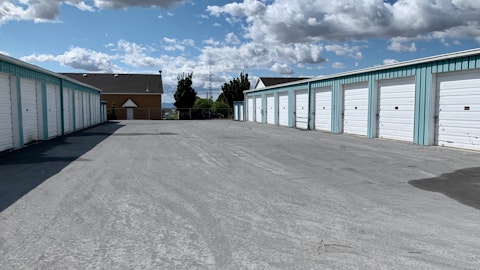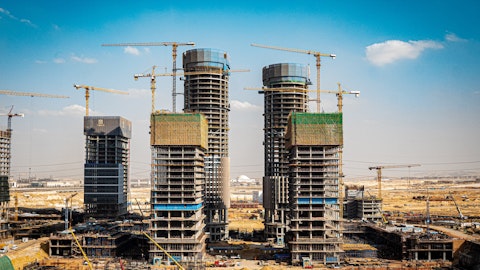Wes Golladay: Yes, the delta on the new leases in the fraud market I get that supply will be here next year. So yes, I think that’s in the run rate. I’m trying to see what kind of potential lift you can have from just having a more normal lease market in the fraud market. So is it artificially low right now on the new leases in those markets you cited?
Alex Jessett: Absolutely it is. I mean, if you think about – to give you an idea, in Atlanta, our new lease effective trade out for October was down 7.1%. So that’s a pretty good indication of a market where we’ve got an ability, once we get that fraud sorted out, to get that back to a far more normal run rate. So absolutely.
Wes Golladay: Great. Thanks for taking the time.
Operator: Our next question comes from James Feldman with Wells Fargo. Please go ahead.
Unidentified Analyst: Hi, team. This is John on for Jamie. There was comments about this before, but just trying to think about revolver and what we need to fund right now for development and where interest rates are, How do you think about growth in this environment.
Ric Campo: I’m sorry. You kind of broke up. We have $180 million roughly left to spend on the development that we have in place now. And what was the other part of your question? Because you broke up.
Unidentified Analyst: I understand. Sorry, can you hear me now?
Ric Campo: Yes.
Unidentified Analyst: Perfect. Just trying to understand, given maturities in 2024 the size of your revolver right now, just how do you afford to, to grow in this environment?
Ric Campo: Alex, you want to take that?
Alex Jessett: Well, bottom line is, we have access to lots of capital markets, right? And bond markets open. The great thing about the multifamily business is that, so the capital markets are open. We could issue bonds to take out the maturities, and we obviously have access to that market, we also have and if the bond market isn’t open, we have access to Freddie and Fannie, and there’s still a robust lending environment out there for multifamily. So we’re not concerned at all about our capital issues. And that isn’t a constraint, I don’t think, given our low debt. And we built this balance sheet for times like this. And when you are sitting at a 4.1 [ph] debt-to-EBITDA with very low debt and having somewhere around $12 billion worth of real estate that has no mortgage on it, that’s a pretty safe position to sit in and to be able to fund maturities and fund capital for opportunities if they manifest themselves.
Ric Campo: Yes, I would just add to that that the revolver is not the constraint at all. And obviously, we’re not thrilled about a 10-year costing us 6%, but that is still a lot cheaper than what it would cost a private person to go out and borrow money. And so if the opportunities are really there and if we can do something accretively to the debt in 2024, that’s what we’ll absolutely do. And for once, we actually do have a cost of capital advantage over the private guys.
Unidentified Analyst: Got it. Thank you.
Alex Jessett: Sure.
Operator: Our next question comes from Robin Lu with Green Street. Please go ahead.
Robin Lu: Hi, good morning. Just one from me. I just want to touch on development. You did well in completing Tempe lease-up without much concessions or outside concessions. How are you thinking about the lease-up strategy for the new Raleigh in Houston properties? Now that those properties are entering the market at a time with more competition, do you expect to provide more incentives to increase occupancy quicker?
Ric Campo: Well, as I said before, it really just depends on the market conditions. Right now, we’re offering, I think, four to six weeks free and on those properties, and we’re getting traction on them and leasing them up. Our Camden NoDa, for example, is doing really well in Charlotte, and we don’t have the kind of concessions, I think that people are worried about the three months free or something like that. But at the end of the day, concessions are just part of the equation in the merchant builder world, and we will compete effectively with all the rest of the properties that are out there, and ultimately they will lease-up. If you look at the absorption rates that we’ve had, and I think Phoenix is a great example.
I mean Phoenix is one of the markets with a lot of supply, yet at the same time, we leased up Tempe II, with a very, very fast pace with limited. We did give concessions, but not dramatically. So I think we’re going to be fine leasing up the properties that we’ve built in both Raleigh and Charlotte going forward.
Robin Lu: All right. Thank you. Appreciate your time.
Ric Campo: Absolutely.
Operator: This concludes our question-and-answer session. Would like to turn the conference back over to Ric Campo for any closing remarks.
Ric Campo: Great. Well, I appreciate everybody on the call today and we will see you very soon at NAREIT in LA. So take care and thank you.
Operator: The conference has now concluded. Thank you for attending today’s presentation. You may now disconnect.
Follow Camden Property Trust (NYSE:CPT)
Follow Camden Property Trust (NYSE:CPT)
Receive real-time insider trading and news alerts





